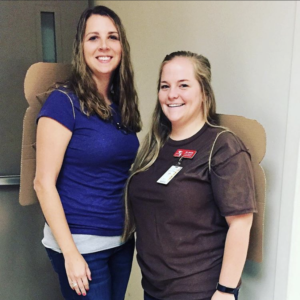In This Post:
- The importance of mentoring for both student teachers and first year teachers.
- Practical tips compiled from years of mentoring experience.
- Helpful ways to mentor new teachers and student teachers, based on mentee feedback!
Mentoring is an art, much like teaching; there’s no other way to describe it. One must find a way to hone in on their own strengths and weaknesses to bring out the best in the other. I have made my fair share of mistakes, but I’m always striving to be better.
I hope the biggest lesson my mentees take away from our time together is that no matter how long you have been in education, you should always strive to improve and change for the better. No two classes or years are ever the same. We must grow, change, and adapt to the ever-changing world of education.
Moreover, nowadays, thanks to corporate mentoring software, the administrative side of forging a mentoring program that gets results has never been easier. Thanks to high potential mentoring programs, for example, it is possible to provide quality mentoring for mentors and mentees that can help both parties to climb the corporate or educational ladder. Ultimately, the transferrable skills that come from being a mentor or mentee are unrivaled.
Below, I have compiled a list of some of the things I do as a mentor. I even asked for feedback from my mentees to see what was the most beneficial to them on their teaching journeys. I hope you will be able to take away something to improve your mentor-mentee relationships.
No two classes or years are ever the same. We must grow, change, and adapt to the ever-changing world of education. Share on XMentoring tip #1: Start them slow.
For my student teachers, I start very slow and gradually work them into my classroom. The first week or two is devoted to observing our students.
I like to use this time to have them start doing more of the clerical work, like taking attendance or lunch count. This also gives them an activity that helps them learn the names of the students. I also have them assist in activities or tasks while I lead the class.
A lot of times within the first week, I let the mentee lead a fun, non-academic, team building activity so the students start to build that trust and bond with them.
By weeks 2-3, I try to hand over one to two classes or subjects. I usually like to see what they are the most comfortable with or give them a class with the fewest classroom management issues. At this point, they are still assisting and observing me for the rest of the day.
From here, it really depends on the mentee’s skill set and comfort level, but I really focus on building their confidence, early and often. This will help you slowly turn over more of the classroom responsibilities.
Hopefully, by the end of the first six to eight weeks, the whole class is turned over to your mentee, and they can really start fulfilling the role as the head classroom teacher.
Mentoring tip #2: It’s “We” and “Our” not “My” and “Mine”
Once a student-teacher walks into my classroom, it becomes our classroom. Nothing is ever completely mine until they have graduated. And sometimes, even then, it still is ours. They need to feel ownership in the room and with the students, and they must feel like they can take risks to try out new ideas, strategies, and lessons. It’s teamwork, especially that first two months until they get their feet under them.
For my first-year colleagues, my room may still remain my room, but the kids we have are shared. So many of them are in both of our classes, or I have had them before. Again, it’s creating a team between the two of you for the betterment of the students.
Mentoring tip #3: Include them in everything.

And I mean everything. Whether you have a first-year teacher or a student teacher, invite and encourage them to take part in all aspects of school life.
For your first-year teachers, they may be overwhelmed, so they may need to limit what they say yes to. But they do need to feel included as a colleague.
For the student teachers, I like to get them involved with anything that encourages staff bonding and directly relates to the students we have in our class. These events or activities could include spirit or dress-up days, potlucks, attending student games or productions, conferences, IEP meetings, and eating lunch in the lounge (but only if it’s a positive place).
Mentoring tip #4: Observe, observe, observe.
Imagine this as a two-way street with a roundabout. Your mentee needs to observe you, you need to observe your mentee. And, sometimes forgotten, your mentee needs to observe other educators.
This is something I am very passionate about. No matter how much of a rockstar educator you are, you don’t want your mentee only observing your teaching. Give them a wide variety of experiences across settings and age groups. Let them see some teachers of all experiences, styles, and effectiveness.
Then sit down and have a conversation about what they observed and what can be taken away from each classroom setting. Mentees need to see the big picture, not just a snapshot.
Mentoring tip #5: Have a regularly scheduled check-in.
It doesn’t matter if this is daily or weekly, a few minutes or full-on conversation, but find what works for both of you. Try to make this a scheduled time so you both know it’s coming and can plan. This could be during lunch, your prep, or after school. The years I have just had check-ins that weren’t scheduled, I know I was not as good a mentor as I could have been.
I always like to ask, “What can I do to help you?” and “What do you need from me?” Yes, a lot of times I need to throw in suggestions or tips on how to do something differently, but I want to be open and honest with them as well.
When making suggestions or trying to steer my mentee in a new direction, I like to use the “pro-con-pro” method. Start with something they are doing awesome at, then give them your suggestion, and finish by encouraging them with a positive word. This helps diminish any strong authority role from mentor to mentee and helps your relationship stay strong and positive. Plus, no one wants to hear just the negative all the time.
Also, let them vent. We all have our hard days, from lessons that exploded in our faces to situations that just broke our hearts. This is a part of our profession, so let your mentee get it out in a safe place. Give positive suggestions when appropriate. But I always end the conversation with “As hard as it is, try not to stress too much. Take a bubble bath or do something relaxing tonight. Unwind.“
I’ve had student teachers that needed a lot less from me, so I gave them the freedom and let them go do their thing with minimal scheduled check-ins. On the other hand, I have had just as amazing educators need a little more guidance and conversation on how to approach their tasks at hand.
There’s no right or wrong way, just find what works for the two of you and what they need most.
Mentoring tip #6: Let them struggle… or even fail.
This sounds a little harsh, and I am not saying that you should let someone epically fail to the point where you both lose your placements. But don’t rush to their aid the very first time something gets a little out of hand.
Let them try to solve the issue themselves, but throw them that life preserver when needed. Sometimes they will surprise you (and even themselves)! The further into the year, the less I try to step in. This drastically adds to the credibility of the mentee as students really start to see them as a real teacher instead of just a helper (which we all know they are not).
Regardless of the situation, I really like to have a conversation with the mentee after the event to see what they thought went well and what they may have struggled with. This opens the dialogue and creates reflective practices.

Mentoring tip #7: Get to know them personally.
School is the number one topic the two of you are going to discuss all the time, but don’t hesitate to get to know who your mentee really is. Ask questions about their family, hometown, hobbies, and talents. Go grab an appetizer after school and dig a little deeper.
A lot of these things will help you understand why they are who they are, but they can also be things that they can bring into the classroom to use in lessons or to build relationships with the students. If a mentee plays an instrument or loves to bake, encourage them to add an extra level to their lessons.
Focus on getting to know your mentee. You want to build a relationship with them just like you want them to build strong relationships with students.
Mentoring tip #8: Give up control.
This can be the hardest one for this Type-A teacher, but it’s a necessity if you want your mentee to be successful. You need to eventually let them have full reign of the classroom, choices, and daily decisions.
About halfway through the semester, if a student asks me to go to the bathroom or nurse, I refer them to my student teacher. The student teacher is the head teacher in charge, so he or she needs to make the decision on whether or not it’s an appropriate time for a student to leave the learning environment.
Another example is to let them write an entire unit plan from scratch. They may not execute the unit from the same perspective as you, but that doesn’t make it wrong or ineffective. Let them have the experience of being completely overwhelmed (in a safe place) and have to figure out this process.
Let your mentee choose lessons, schedules, and more. With student teachers, we always discuss these together, but I do my best to let them have total ownership. It’s amazing to watch this process and see how their confidence and skillsets grow.
Mentoring tip #9: Encourage Teacher Twitter & Instagram
In this digital age, our new portfolios are social media accounts. Encourage your mentee to have this visual and interactive portfolio to showcase the amazing things they are doing and learning.
Have them show off a cool experiment, project, or meaningful takeaways from professional development. They can then begin to follow other edu-leaders, make connections, and discover new practices.
This also encourages the idea of sharing work with a worldwide audience and communicating with schools and families. Social media links are now commonplace on resumes as well. Always follow school policy in regards to posting student work and media, including rules for student pictures.
[scroll down to keep reading]ABOUT WHITNEY CHOATE
Whitney Choate is currently in her ninth year as a secondary special education teacher and is also an instructional technology specialist at Cape Central High School in Cape Girardeau, Missouri. She earned her Bachelor’s degree in Learning and Behavioral Disorders and a Master’s degree in Autism. She has a passion for teaching and mentoring learners of all ages. Whitney is also the co-host of the Tough Talk with Teachers Podcast.



